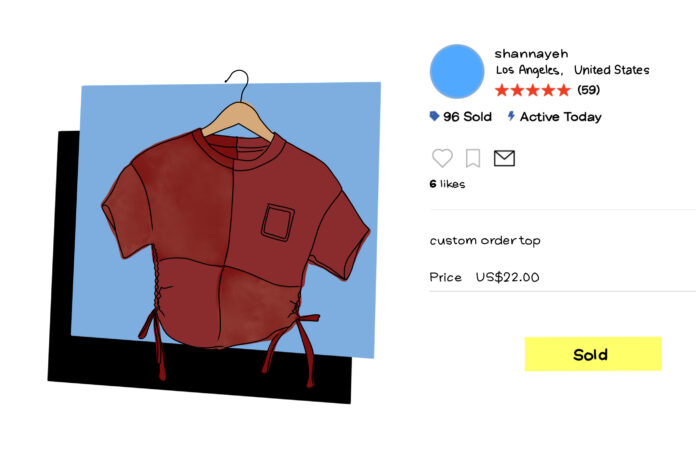With an abundance of free time during the initial months of the COVID-19 lockdown, students at Occidental started small businesses where they upcycle old clothing and fabrics to sell to others interested in moving away from fast fashion.
Sonali Govind (sophomore) said she started Lil Pop Shop because she wanted to help people engage in environmentally-friendly fashion. Drawing inspiration from other sellers using platforms such as Depop, Govind designs tops ranging from cropped tank tops to cropped tees.
Govind said she sews on small patches of hearts and butterflies and adds safety pins to the sides of the tops to incorporate her own touch.
“It’s a little bit edgier than your normal crop top,” Govind said. “It’s also a different look that you don’t usually see.”
On her business’ Instagram account, Govind said she emphasizes the importance of keeping prices low, similar to fast fashion, while ensuring a high quality of ethically-made clothing.
“I want to make my clothing affordable for people. I know that handmade things obviously are going to be more expensive and with fast fashion, I know that you can get cute stuff for even cheaper,” Govind said.
Shanna Yeh (junior) said she was inspired to engage more sustainably with fashion and spent her free time during quarantine sewing and upcycling her own clothes.
“I looked at all my habits and tried figuring out what I could change to become more environmentally conscious and sustainable and be able to live that,” Yeh said.
Drawing inspiration from online clothing stores, Yeh said she uses old fabrics and clothes to make tops which she sells on her Depop account.
With over 53,000 followers on TikTok, Yeh promotes her line with videos of herself modeling clothing that she has upcycled as well as documenting her creative process from start to finish, according to Yeh.
“I started uploading a lot of my sewing videos on TikTok back when quarantine first started, and it was weird because I thought it was so cringey in the beginning,” Yeh said. “Then some of my videos started getting a lot of views and I was like, ‘Maybe I could do something with this.’”
Olivia Vazquez (sophomore), founder of Babydoll Bralettes, said she sells a variety of clothing including shirts, crop tops, swim tops and bottoms, matching tops and shorts and bathing suit covers on Etsy as well as Instagram.
Making a conscious effort to sell sustainable clothing, Vazquez said she avoids using synthetic yarn in her clothing and instead favors more durable yarn such as cotton and acrylic.
“I try to stay away from synthetic yarn, and anything that’s not as environmentally friendly,” Vazquez said. “A lot of synthetic materials just don’t hold up as well over time and get distressed a lot more easily.”
In creating her Etsy shop, Vazquez said she aims to create products that are able to last a long time, unlike fast fashion, and encourages others to move away from fast fashion as well.
“If there are already clothes out there, why not just put all that together to make new clothes, instead of buying from bigger businesses and creating more clothing waste?” Vazquez said.
For those who want to be more environmentally conscious, Vazquez said to read more clothing labels in order to be aware of what it is you are really purchasing.
“Make sure you’re looking at the materials that the clothes you’re buying are made with, and be conscious of what you’re buying and less focused on where you’re buying it from,” Vazquez said.
Reflecting on what was helpful for her when moving away from fast fashion, Yeh said she asks herself questions before buying clothes to determine if a more sustainable decision can be made, as well as the impact this decision can have on the environment.
“I try to ask myself questions like: Do I really need this? Do I have something similar to it in my closet? Can I make something like it?” Yeh said.
According to Govind, educating yourself on what you are buying and becoming more aware of the impacts of your purchases can help in making more environmentally-friendly decisions.
“I think it’s very easy to ignore the effects of fast fashion, when you don’t fully understand what’s going on. Ask yourself, who are the people that are making the clothing? How is this affecting their towns, villages or communities? What are the environmental impacts?” Govind said. “Once you make this more personal and you see how people are treated, I think that is when people shift their ideology.”
![]()




































